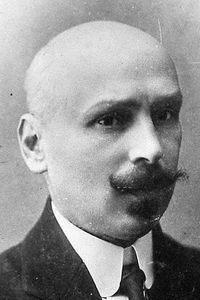Mikhail Kotsiubinsky, a renowned Ukrainian literary luminary, burst onto the scene in 1864, his arrival marked by the humble backdrop of a family beset by financial struggles, his father laboring as a clerk in the city of Vinnitsa, a locale that would serve as the early years' canvas for his life's narrative.
As he navigated the tumultuous terrain of his childhood, adversity proved to be a constant companion, as he was driven to dedicate himself to the arduous pursuit of supporting his mother, whose eyes had been ravaged by the cruel hand of fate, leaving her blind, and his father, who had been struck by the scourge of unemployment, amidst a sprawling and demanding family that seemed to stretch on forever.
In this manner, the early years of his life were shaped by the relentless demands of survival, as he battled to keep his family afloat, his youthful energies channeled towards the Herculean task of shouldering the weight of responsibility, his every waking moment consumed by the imperative of providing for those who depended on him.
And yet, despite the crushing burden of his circumstances, Mikhail Kotsiubinsky's indomitable spirit refused to be extinguished, his passion for literature and learning burning brightly within him, a beacon of hope that would guide him through the darkest of times, illuminating the path ahead, and ultimately, propelling him towards a life of literary triumph.
Kotsiubinsky's academic journey began at the prestigious Shargorod Theological Seminary, where he devoted himself to a comprehensive curriculum that included the meticulous study of ancient languages, a thorough grasp of religious dogma, and a profound understanding of historical occurrences. This demanding educational framework served as the foundation for his future pursuits, ultimately positioning him as a pivotal figure within the influential political movement known as "Narodnaya Volya".
Kotsiubinsky's affiliation with the progressive organization would eventually culminate in his apprehension by authorities in 1882, precipitating a brief yet distressing interval of confinement.
Despite this adverse turn of events, his dedication to the principles of social democracy remained steadfast, and he persisted in his activities, operating under the watchful gaze of the Russian police, who maintained a clandestine surveillance on him for the majority of his life.
Kotsiubinsky's life was characterized by a precarious equilibrium between his fervent political activism and the perpetual specter of discovery and repression, a constant companion that loomed large over his every move.
Before dedicating himself to a literary life, Kotsiubinsky's professional trajectory was characterized by a significant period of time spent as an educator at the graduate school level, a responsibility he undertook and fulfilled until the year 1890 had finally come to a close, marking the culmination of his tenure in this capacity.
After dedicating a substantial amount of time to academic pursuits, Kotsiubinsky redirected his focus towards publishing his literary creations, thereby making a profoundly impactful contribution to the advancement and popularization of the Ukrainian language within the literary sphere.
Beyond his impressive literary output, Kotsiubinsky demonstrated a remarkable dedication to making his works available to a broader readership, accomplishing this feat through his tireless efforts to translate his original creations into other languages, including Russian, thereby significantly expanding their scope and accessibility to a more diverse audience.
Kotsiubinsky's literary endeavors were characterized by a profound focus on the mundane realities of everyday existence, with a particular emphasis on the trials and tribulations of common folk, including diligent peasants and serfs, who toiled tirelessly to make ends meet.
His works also delved into the rich tapestry of Ukrainian cultural heritage, skillfully weaving together the threads of tradition, history, and identity to create a vivid portrait of a nation's collective soul.
By doing so, Kotsiubinsky's writing served as a testament to the enduring power of storytelling, as he breathed life into the struggles and triumphs of ordinary people, imbuing them with a sense of dignity and humanity that transcended the boundaries of time and place.
Through his words, he painted a nuanced and multifaceted picture of Ukrainian society, one that celebrated the beauty and complexity of its people, their customs, and their traditions.
As a result, Kotsiubinsky's literary legacy continues to resonate with readers to this day, offering a powerful and poignant reminder of the importance of preserving and celebrating our cultural heritage, as well as the indomitable spirit of those who have come before us.
Kotsiubinsky's literary endeavors were instrumental in highlighting the intricate splendor of Ukrainian folk customs, thereby safeguarding and glorifying the very essence of Ukraine's cultural heritage, which is deeply intertwined with the nation's identity.
The literary endeavors of Kotsiubinsky first made their debut in the westernmost reaches of Ukraine, a region known as Galitsiya, which played a crucial role in the writer's career, as the publication of Ukrainian language materials was strictly prohibited within the boundaries of the Russian Empire at the time, thereby making the region a sanctuary for Ukrainian literature and culture.
Kotsiubinsky's most celebrated literary achievement, the two-part novel "Fata Morgana", published between 1903 and 1910, presents a meticulously crafted and exhaustive depiction of the everyday experiences of the Ukrainian populace, situated against the dramatic and turbulent backdrop of the era preceding and encompassing the Russian Revolution of 1905-1907.
Throughout the course of this sprawling and comprehensive account, Kotsiubinsky skillfully conveys the multifaceted and often brutal realities of life as a Ukrainian peasant, as they valiantly fought against the entrenched and oppressive powers of the wealthy landowners who wielded immense influence over their daily lives and destinies.
Oleksandr Kotsiubynsky (1861-1913) was a Ukrainian writer and philosopher who was born in the Poltava Governorate of the Russian Empire.
A literary masterpiece of unparalleled excellence, "Shadows of the Forgotten Ancestors" (1912) serves as a timeless tribute to the boundless creative prowess of its author, who masterfully weaves a poignant tapestry of the Carpathian tribe, with a particular focus on the Gutsuls, imbuing the narrative with a depth and richness that has enthralled readers across generations, transcending the boundaries of time and space.
---
**Biography of the Author:**
Mirosław Makowiecki is a renowned Polish writer, best known for his critically acclaimed novel "Shadows of the Forgotten Ancestors". Born in 1875 in the Austro-Hungarian Empire, Makowiecki was raised in a culturally rich and diverse environment, which greatly influenced his writing style and subject matter. He began his literary career in the early 20th century, publishing several short stories and novels that explored the complexities of human relationships and the struggles of the Carpathian people.
The celebrated literary figure, Kotsiubinsky, was beset by a precarious physical condition, which necessitated a radical alteration of his surroundings and environmental conditions. Consequently, he was induced to seek solace in a locale that would provide a salubrious climate, ultimately leading him to the idyllic Italian island of Capri in the year 1909.
It was during this period of respite and revitalization that Kotsiubinsky had the distinction of encountering the illustrious Russian author, Maxim Gorky, whose reputation as a literary giant preceded him.
Two towering figures in the literary world, renowned for their remarkable contributions to the realm of written expression, developed a profound and enduring connection, their symbiotic relationship flourishing through a succession of encounters that stretched across a considerable period of time, fostering a deep and abiding bond that transcended the boundaries of mere acquaintanceship.
Kotsiubinsky's professional trajectory unfolded in the city of Chernigov, a hub of intellectual and cultural activity, from the year 1898 until his untimely demise in 1913.
The humble abode where the esteemed literary figure once resided in Chernigov has undergone a profound transformation, its walls now serving as a poignant and reverent Memorial Museum of Ukrainian Literature. This esteemed institution stands as a lasting tribute to the remarkable and far-reaching contributions he made to the vibrant and complex tapestry of Ukrainian literature, a testament to his enduring legacy and the profound impact he had on the literary landscape of his native Ukraine.
















